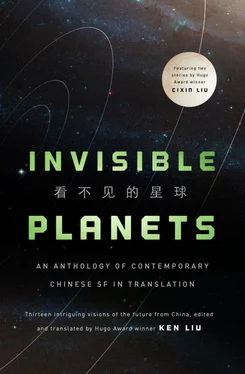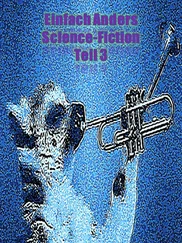Black Cannon laughs coldly. “You need to stop thinking they’re people.”
He’s right. The rats are not people. They’re not even real rats. They’re just carefully designed products—actually, products that failed quality assurance.
I notice something strange about the paw prints. Most seem smaller than usual and only lead away from the nests. But in front of each nest there is one set that is bigger in stride length and deeper, with a long drag mark down the middle. The bigger trails only go into the nests but don’t come out.
“These are”—I try to keep my voice from shaking—“birthing rooms.”
“Sir!” A man stumbles over. “You have to see this.”
We follow him to a tree. Underneath there’s a tower made from carefully stacked rocks. There’s a sense of proportion and aesthetics in the pattern of their shapes and colors. From the tree, eighteen dead male rats hang, their bellies open like unzipped sacks.
A light layer of white sand is spread evenly around the tree. Countless tiny prints can be seen in the sand, surrounding the tree in ever-widening rings. I imagine the ceremonial procession and the mystical rituals. It must have been as wondrous as the scene in Tiananmen Square, when the flag is raised on National Day.
* * *
“Oh, come on! This is the twenty-first century. Man has been to the moon! Why are we using these pieces of scrap metal?” Pea, his head now shaven so that he looked even more like a pea, stood up and protested.
“That’s right,” I echoed. “Isn’t the government always talking about modernizing defense? We should have some high-tech toys.” Others in the barracks joined in.
“AT-TEN- TION !”
Complete silence.
“High-tech toys?” the Drill Instructor asked. “For the likes of you? You college kids don’t even know how to hold a pair of chopsticks straight. If I give you a gun, the first thing you’ll do is shoot your own nuts off! Now pack up. We’re mustering in five minutes for a twenty-kilometer march.”
We were issued the following kit: a collapsible short spear (the head could be disassembled into a dagger), an army knife with a serrated blade, a utility belt, a compass, waterproof matches, rations, and a canteen. The Drill Instructor had no faith we could handle anything more advanced.
As if to prove his point, at the end of the practice march, three of us were injured. One fell and sat on the blade of his knife and became the first to be discharged from our platoon. I don’t think he did it on purpose—that would have required too much dexterity.
As we neared the end of training period, I saw anxiety in most eyes. Pea couldn’t sleep, tossing and turning every night and making the bed squeak. By then I had gotten used to life without TV, without the Internet, without 7-Eleven, but each time I thought about the idea of impaling a warm, flesh-and-blood body with a carbon fiber spear, my stomach churned.
There were exceptions, of course.
Whenever one of us passed the training room, we could see Black Cannon’s sweaty figure practicing with his spear. He assigned himself extra drills, and constantly sharpened his knife with a grindstone. Someone who knew him from before told us that he was a quiet kid in school, the sort that got bullied by others. Now he seemed like a bloodthirsty butcher.
Six weeks later, we had our first battle, which lasted a total of six minutes and fourteen seconds.
The Drill Instructor had us surround a small copse. Then he gave the order to charge. Black Cannon went in first. Pea and I looked at each other, hesitated, and brought up the rear. By the time the two of us got to the scene, only a pool of blood and some broken limbs were left. They told me that Black Cannon alone was responsible for eight kills. He chose to keep one of the corpses.
At the meeting afterward, the Drill Instructor commended Black Cannon and criticized “a small number of lazy individuals.”
Black Cannon skinned his trophy. But he didn’t properly cure it, so the skin soon began to rot and smell and became full of maggots. Finally his bunkmate burned it one day when he was out.
* * *
Morale is low.
It’s not clear what’s worse—that the rats have figured out how to bypass the artificial limits on their breeding capacity, or that they have demonstrated signs of intelligence: construction of structures, hierarchical society, even religious worship.
My paranoia is getting worse. The woods are full of eyes, and the grass is full of whispers.
It’s night. I give up on trying to sleep and crawl out of the tent.
The early winter stars are so clear that I think I can see all the way to the end of the universe. The sound of a lone insect pierces the silence. My heart clenches with a nameless sorrow.
Sha! I turn around at the sound. A rat is standing erect on its hind legs about five meters away, like another soldier missing home.
I duck down for the knife in my boot sheath. The rat crouches down, too. Our eyes remain locked. The second my hand touches the knife, the rat turns and disappears into the woods. I grab the knife and follow.
Normally I should be able to catch it in about thirty seconds. But tonight, I just can’t seem to close the distance between us. From time to time, it even turns around to see if I’m keeping up. This infuriates me.
The air is full of a sweet, rotting smell. I take a break in a small clearing. I feel dizzy. The trees around me sway and twist, glistening oddly in the starlight.
Pea walks out of the woods. He’s wearing his glasses, which ought to be thousands of kilometers away in his parents’ possession. His body is whole, without that hole in the chest from that tree branch.
I turn around and see my parents. My dad is wearing his old suit, and my mom is in her plain dress. They’re smiling. They look younger, their hair still black.
Tears roll down my face. I don’t need logic. I don’t need sense.
The Drill Instructor finds me before I die of hypothermia. He tells me that I have enough tears and mucus on my face to fill a canteen.
* * *
Pea finally said something meaningful. “Living is so…”
He didn’t finish his sentence. Tiring? Good? Stupid? You could fill it in however you wanted. That was why I said it was meaningful. Compared to his old way of talking, this new style was forceful, to the point, and left plenty of room for imagination. I admit it—all those literary criticism classes did teach me something.
For me, living was so… unbelievable. Half a year ago, I never imagined that I would get to bathe only once a week, that I’d be sleeping with lice in the mud, that I’d fight other men my age for a few stale wowotou biscuits, that I’d tremble with excitement at the sight of blood.
Human beings are far more adaptable than we imagine.
If I hadn’t joined the Rodent-Control Force, where would I be now? Probably wasting my time on the Internet all day, or maybe staying at home with my parents so we could sit around and drive one another nuts, or maybe carousing with a gang of social misfits and wreaking havoc.
But today, when the Drill Instructor gave the order, I was out there, waving my spear like a real hunter, chasing rats with their furs of all different colors. The rats were stumbling on their hind legs, designed more for cuteness than function, and screamed in their desperation. I heard that rats certified for export were given further surgical modifications so they could vocalize better. I imagined those rats screaming, in English, “No!” or “Don’t!” and then looking down as the spear impaled their bellies.
Eventually the platoon developed an unwritten code. After a battle, every man handed the Drill Instructor the tails of the rats he had killed so a tally could be made. The records were supposed to influence what jobs we’d be recommended for after discharge.
Читать дальше












